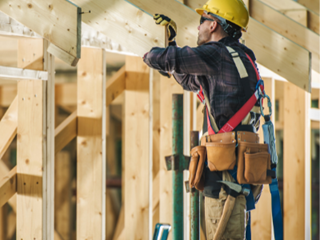
At a glance
The Help to Build equity loan scheme was announced by the Government in April 2021. It said the scheme, which launched in 2022, would provide £150m in the form of loans to those wanting to get a self-build mortgage.
Individuals, including first-time buyers and those moving home, could apply for this scheme until 31 March 2025.
The scheme aimed to make it more affordable to build your own home. The Government stated that borrowers typically needed to fund around 25% of the total land and building costs themselves when building their own home, but this scheme would allow them to pursue this option with just a 5% deposit.
The equity loan could cover between 5% and 20% of the total estimated land and building cost (or up to 40% in London).
Borrowers then needed to apply for a self-build mortgage from a lender registered with the Help to Build scheme to cover the rest of the cost.
Once the house was built, the scheme paid the Help to Build equity loan to the mortgage lender. The homeowner would then be switched to a repayment mortgage (after the lender had conducted the necessary checks), which would need to be in place until the equity loan was paid off in full.
To be eligible for the loan, borrowers needed to be aged 18 or over, have the right to live in England and intend to live in the property as their only home. Moreover, they needed to be able to get a self-build mortgage from a lender that was registered with the scheme.
Some of the projects the loan could be used for included:
It couldn’t be used to upgrade an existing home or to build a second home.
The estimated cost of the building project couldn’t be more than £600,000 (if you needed to buy a plot of land and build your home).
If you wanted to build on land you already owned, the estimated cost couldn’t be more than £400,000.
Help to Build equity loans typically have terms of 25 years, after which you need to repay the loan in full. If you sell your home or repay your mortgage in full before the end of the term, you will need to repay the loan at this point.
It’s possible to partially or fully repay the loan at any point. Bear in mind that, because the equity loan is a percentage of your property’s market value, the amount you owe could fluctuate depending on how its value changes.
The loan is interest-free for the first five years, then interest is charged at 1.75% in the sixth year. The interest rate subsequently increases each year by the rate of the Consumer Price Index (CPI) plus 2%. You will need to make the interest payments each month.
A monthly management fee of £1 also applies for the duration of the equity loan.
For more information on the Help to Build equity loan, see the Government website.
Even though the above scheme has finished, borrowers can still apply for a self-build mortgage.
One of the key features of a self-build mortgage is that the lender can release the money in stages, when you buy the land, complete the foundations and reach other points in the construction process, for example.
This means you are only charged interest on the sums you’ve drawn from, instead of borrowing the whole amount up front and then starting to incur interest on the whole balance from day one.
Furthermore, many self-build mortgages are interest-only while the property is being built.
It’s important to do your own research before starting your self-build project. Furthermore, it’s a good idea to speak to a mortgage broker and get professional advice to help ensure you get the right form of funding for your situation.
Find out more information about these specialist mortgages and compare the latest deals available on our self-build mortgages chart.
Mortgage brokers remove a lot of the paperwork and hassle of getting a mortgage, as well as helping you access exclusive products and rates that aren’t available to the public. Mortgage brokers are regulated by the Financial Conduct Authority (FCA) and are required to pass specific qualifications before they can give you advice.
Get friendly, expert advice free of charge as a visitor of MoneyfactsCompare
Mortgage Advice Bureau have 1,600 UK advisers with 200 awards between them.
Speak to an award-winning mortgage broker today.
Call 0800 031 8553 or request a callback
Mortgage Advice Bureau offers fee free mortgage advice for MoneyfactsCompare visitors that call on 0800 031 8553. If you contact Mortgage Advice Bureau outside of these channels you may incur a fee of up to 1%. Lines are open Monday to Friday 8am to 8pm and Saturday 9am to 1pm excluding bank holidays. Calls may be recorded.
Your home may be repossessed if you do not keep up repayments on your mortgage.
Disclaimer: This information is intended solely to provide guidance and is not financial advice. Moneyfacts will not be liable for any loss arising from your use or reliance on this information. If you are in any doubt, Moneyfacts recommends you obtain independent financial advice.